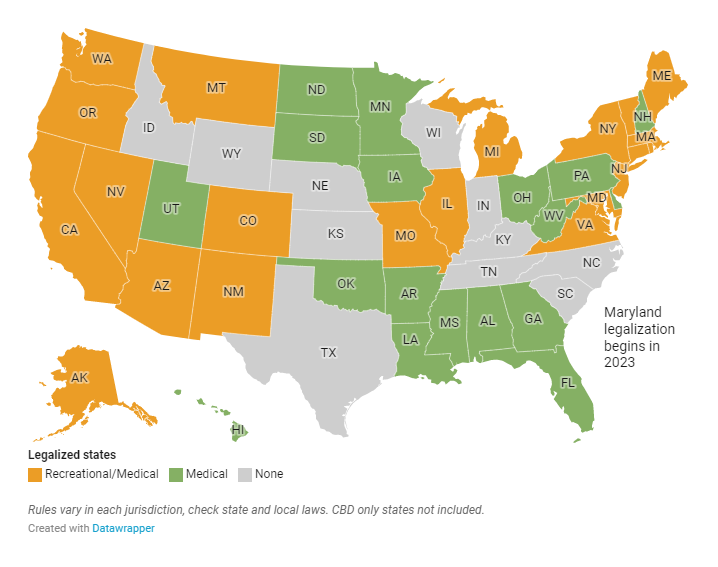
Top 5 Cannabis Trends for 2023

Top 5 Cannabis Trends for 2023
Although 2022 was a roller coaster for many industries, very few industries have been as exciting (or as chaotic) as cannabis. And things aren’t slowing down.
The industry is witnessing some major changes all the way down, from which products are stocking shelves to legal reform and multi-billion-dollar acquisitions. Staying ahead of the curve and understanding the state of the industry is crucial to making sure your business is able to survive the industry’s volatility.
In 2023, expect continuing attitude changes at both the societal and government levels, and anticipate what that might mean for your marketing and sales strategies. 2023 could be a make-or-break for many businesses, and the deciding factor is going to come down to how able you are to adapt.
Let’s take a deeper look at what we can expect from the industry in 2023.
Source: https://mjbizdaily.com/map-of-us-marijuana-legalization-by-state/
Increased legalization
Although federal legalization remains an obstacle to businesses across the country, momentum at the state level continues to drive the industry forward. With the recent additions of Missouri and Maryland, 21 states have legalized recreational cannabis so far. Despite temporary defeats, cannabis advocates in Arkansas, North Dakota, and South Dakota have refused to yield their demand for reform.
Last summer, Florida’s Supreme Court shot down a pair of recreational petitions, but advocates have returned with a more legally sound initiative that could put cannabis back on the ballot. Furthermore, Oklahoma citizens will be voting on the approval of adult-use marijuana in a special election to be held on March 7, 2023, after the Secretary of State’s office failed to verify the signatures necessary to bring the market to vote back in November.
While recreational cannabis usage has received major opposition in some states such as Texas and Tennessee, medical cannabis legalization may provide the gateway necessary for future reform. In early 2022, Mississippi Gov. Tate Reeves signed legislation legalizing medical cannabis for patients suffering from chronic illness, demonstrating a major win for cannabis after a long-history of prohibition.
Nearly two-thirds of the country currently supports federal legalization, a figure that is only going to continue to rise as increased awareness is brought to the benefits of decriminalization and public stigma fades. President Joe Biden himself has advocated for federal reform, having pardoned individuals convicted of simple marijuana possession under federal law back in October.

Advanced innovation
With recreational cannabis now legal in 21 states and medical in 39 states, the cannabis industry has witnessed nearly unparalleled growth over the past couple years. Loaded with potential, the emergent industry has driven a demand for increased innovation at both the consumer and business level.
Cannabis-infused products and edibles have provided an attractive entryway for new customers who haven’t tried cannabis before or may be intimidated by smoking. Long-time consumers who are already familiar with cannabis now have access to new and exciting cannabis strains that were previously difficult to obtain. This new interest in specific flavor profiles and psychological effects has fueled the development of highly specialized products, and it’s possible that consumers may have access to personalized strains in the near future. Advancements in growing technology allow growers to alter the cannabinoid makeup of their plants to produce desired effects to meet individual needs, such as reducing anxiety, improving sleep, and driving creativity.
Additionally, businesses themselves are benefiting from the influx of new technology. With modern advances in operational technology, cultivators are experiencing never-before-seen productivity in growing, manufacturing, and distribution. This means more overall products are being delivered to store shelves and at a fraction of the cost.
New tech related to growing equipment, especially lighting, hydroponics, and nutrient delivery, has raised the bar drastically for what a high-quality plant looks like. In order to compete with other businesses, cannabis cultivators and manufacturers have to utilize all the technology at their disposal to deliver a world-class product.

Health and wellness messaging
Part of cannabis’ success in acquiring public support for legalization has been the major increase in health and wellness messaging. Cannabis has been in the research spotlight for years, and now some researchers are learning that some compounds in cannabis may have anti-cancer and anti-inflammatory properties. Not only does cannabis itself possess these properties, but scientists may be able to synthesize new compounds to replicate naturally occurring cannabinoids.
Furthermore, new research suggests that CBD may possess antibiotic effects, and could even be capable of treating infections that are otherwise antibiotic-resistant. This could lead to the development of CBD products based around its antibiotic properties, especially in topical creams and oils.
In general, many people have already been looking for alternatives to traditional medicine and drugs, and cannabis is increasingly seeming like the best substitute. The plant has witnesses major success in alleviating symptoms in patients suffering from illnesses such as depression, epilepsy, multiple sclerosis, cancer, glaucoma, Parkinson’s disease, Crohn’s disease, and more. As awareness grows, so will the demand for cannabis products as an alternative to traditional medicine.
Cannabis is also seeing increased support as a more health-conscious alternative to alcohol consumption, especially when it comes to edibles and infused-beverages. Just like alcohol, cannabis induces psychological effects when consumed, but differs in that it lacks many of the alcohol-associated side-effects such as hangovers, physical addiction, liver disease, and alcohol poisoning.

Celebrity partnerships
Due to both regulatory obstacles and the inability to leverage many traditional advertising channels in the same way other industries do (such as Google and Facebook), cannabis brands must get creative in their advertising.
Celebrity endorsements — or even celebrity-headed brands — lend legitimacy to a brand and inspire trust in potential customers. By giving a face to a brand, cannabis businesses are able to establish themselves as a reputable source for cannabis consumers — and the bigger the name, the bigger the leverage. Celebrities across many medias have invested in or established their own cannabis ventures, including actress Gwyneth Paltrow, boxing legend Mike Tyson, and ex-NFL tight end Rob Gronkowski.
Weedmaps, the leading online marketplace for cannabis consumers, partnered with Wheelhouse Labs and rapper Killer Mike to develop Tumbleweeds with Killer Mike, a four-part docuseries celebrating the evolution of cannabis culture in New York, Las Vegas, San Francisco, and Chicago.
Curaleaf, the world’s largest cannabis retail and distribution chain by revenue, is also looking to entertainment and celebrity partnerships for reaching new audiences. The company recently launched a new strain and promotional items in collaboration with California-based muralist James Haunt. Curaleaf also partnered with Chicago music venue The Salt Shed to spread awareness for its brand, Grassroots.

Continued consolidation
As with any other emergent industry experiencing astronomical growth rates, the cannabis industry is aggressively consolidating through mergers and acquisitions. Smaller local operators are being absorbed by larger multi-state businesses as they expand their footprint at the state and federal level. Although federal legalization may still be a ways away, multi-state operators are hoping to capitalize on new jurisdictions before the market is saturated.
Much of the M&A activity in the cannabis space is a result of the industry’s overall volatility, which is to be expected with a relatively immature market history and varied legal status across regions. This volatility means that although there’s a lot of potential for up-and-coming businesses who play their cards right, many other businesses will struggle to establish a secure a foothold.
With this in mind, the biggest names in cannabis — Curaleaf, Trulieve, Aurora, Green Thumb, Tilray, and more — are poised to get even bigger as more states pass legislation around recreational use and small to medium-sized businesses look to cash out.
- Some of the most notable mergers and acquisitions in the industry include:
- Tilray’s merger with Aphria for a market cap of $8.2 billion
- Trulieve’s $2.1 billion acquisition of Harvest Health
- AYR Strategies’ $101 million acquisition of Garden State Dispensary
- Cresco Labs’ $2 billion acquisition of Columbia Care
With sales continuing to grow in the U.S. and internationally, both retail and cultivation companies are prime targets for mergers and acquisitions heading into 2023.

Navigating a rapidly evolving industry
The cannabis industry transforms wildly every year amidst major legal reform, advances in technology, evolving public opinions, and changes in company ownership. Although loaded with potential, the cannabis industry can be extremely difficult to navigate, and many businesses are facing the disastrous consequences of trying to enter the space without access to the right tools and resources. Going in blind simply isn’t feasible for businesses hoping for any form of longevity.
So the question remains, what ARE the right tools and resources? How do cannabis businesses harness the insights they need to not only establish themselves in the industry, but to also thrive in it?
The answer lies in their data.
By mobilizing the power of their data, cannabis businesses can gain real-time visibility into what’s working and what’s not and respond to market obstacles and opportunities as they happen. This allows businesses to shift their approach from reactive to proactive and give them the leverage they need to stay ahead of the competition.
Some key functions to keep in mind include:
- Comparing inventory management holding costs against projected/actual sales
- Integrating cultivation data feeds (lighting, HVAC, humidity, etc.) into one central location
- Pricing & program analysis
- Purchasing & operations analysis
- Revenue & expense analysis
- Regulatory reporting
- Territory/brand management
But to really capitalize on your data, you need the right solution. CannaBI, powered by Dimensional Insight, has established itself as one of the most powerful and comprehensive solutions in cannabis analytics. With built-in integration, KPIs, analytics, and visualization capabilities, we can not only help address your organization’s data needs from start to finish, but we also do it better than other analytics companies.
Our technology is built upon an integrated set of analytical services that work together seamlessly to help you assemble and analyze the most relevant information. Other approaches that rely on multiple technologies lack the flexibility to meet the nuanced challenges of the cannabis industry. With CannaBI, you gain real-time speed, seamless integration of data sources, the flexibility to view data the way you want to see it, and the governance that provides a single source of truth for your organization.
Interested in learning more about how analytics can help your business increase revenue and cut costs?
In this white paper, we will talk about:
Increased legalization
Advanced innovation
Health and wellness messaging
Celebrity partnerships
Continued consolidation
Navigating a rapidly evolving industry


